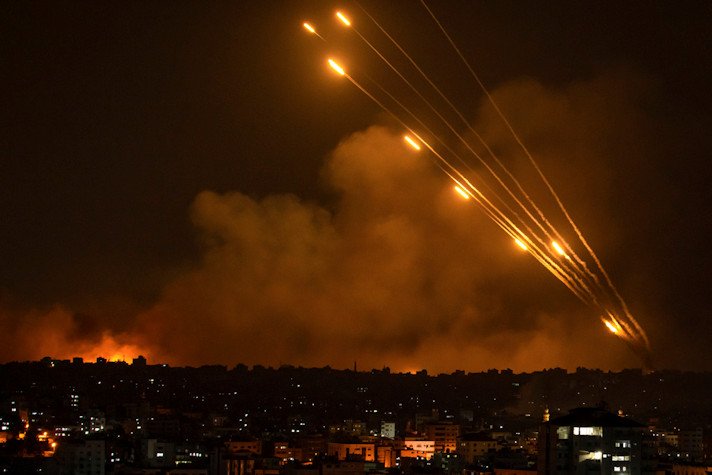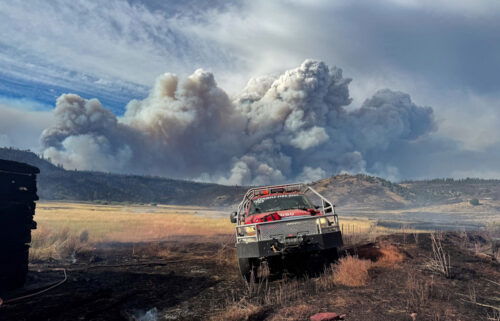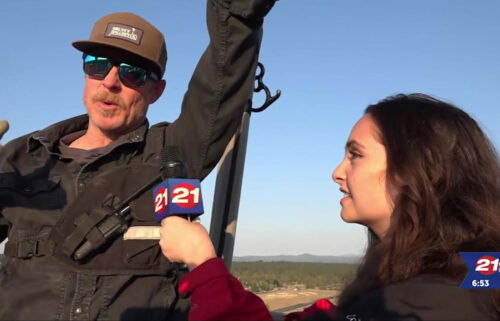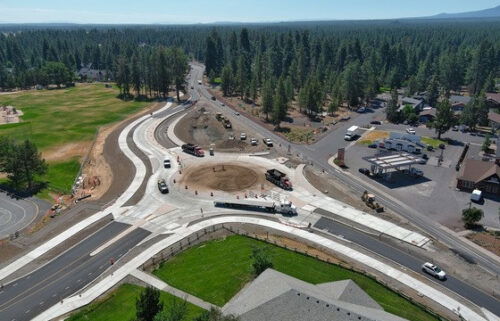Israel declares war, bombards Gaza and battles to dislodge Hamas fighters after surprise attack

By TIA GOLDENBERG and WAFAA SHURAFA
Associated Press
TEL AVIV, Israel (AP) — The Israeli government formally declared war and gave the green light for “significant military steps” to retaliate against Hamas for its surprise attack, as the military labored into Monday to crush fighters still in southern towns and intensified its bombardment of the Gaza Strip. The toll passed 1,100 dead and thousands wounded on both sides.
More than 40 hours after Hamas launched its unprecedented incursion out of Gaza, Israeli forces were still battling with militants holed up in several locations. At least 700 people have reportedly been killed in Israel — a staggering toll on a scale the country has not experienced in decades — and more than 400 have been killed in Gaza.
Israel said it brought in special forces to try to wrest control of four Israeli sites from Hamas fighters, including two kibbutzim that militants entered earlier in their attacks. Footage released by Israeli police from one area showed forces kneeling in tall grass as they exchanged fire with Hamas militants across an open field.
The declaration of war portended greater fighting ahead, and a major question was whether Israel would launch a ground assault into Gaza, a move that in the past has brought intensified casualties.
Meanwhile, Hamas and the smaller Islamic Jihad group claimed to have taken captive more than 130 people from inside Israel and brought them into Gaza, saying they would be traded for the release of thousands of Palestinians imprisoned by Israel. The announcement, though unconfirmed, was the first sign of the scope of abductions.
The captives are known to include soldiers and civilians, including women, children and older adults — mostly Israelis but also some people of other nationalities. The Israeli military said only that the number of captives is “significant.”
The Israeli military estimated 1,000 Hamas fighters took part in Saturday’s initial incursion. The high figure underscored the extent of planning by the militant group ruling Gaza, which has said it launched the attack in response to mounting Palestinian suffering under Israel’s occupation and blockade of Gaza.
The gunmen rampaged for hours, gunning down civilians and snatching people in towns, along highways and at a techno music festival attended by thousands in the desert. The rescue service Zaka said it removed about 260 bodies from the festival, and that number was expected to rise. It was not clear how many of those bodies were already included in Israel’s overall toll.
In response, Israel hit more than 800 targets in Gaza so far, its military said, including airstrikes that leveled much of the town of Beit Hanoun in the enclave’s northeast corner.
Israeli Rear Adm. Daniel Hagari told reporters Hamas was using the town as a staging ground for attacks. There was no immediate word on casualties, and most of the community’s population of tens of thousands likely fled beforehand.
“We will continue to attack in this way, with this force, continuously, on all gathering (places) and routes” used by Hamas, Hagari said.
Civilians on both sides were already paying a high price. The Israeli military was evacuating at least five towns close to Gaza.
A line of people snaked outside a central Israel police station to supply DNA samples and other means that could help identify missing family members.
Mayyan Zin, a divorced mother of two, said she learned that her two daughters had been abducted when a relative sent her photos from a Telegram group showing them sitting on mattresses in captivity. She then found online videos of a chilling scene in her ex-husband’s home in the town of Nahal Oz: Gunmen who had broken in speak to him, his leg bleeding, in the living room near the two terrified, weeping daughters, Dafna, 15, and Ella, 8. Another video showed the father being taken across the border into Gaza.
“Just bring my daughters home and to their family. All the people,” Zin said.
In Gaza, a tiny enclave of 2.3 million people sealed off by an Israeli-Egyptian blockade for 16 years since the Hamas takeover, residents feared further escalation. Israeli strikes flattened some residential buildings.
Nasser Abu Quta said 19 members of his family including his wife were killed when an airstrike hit their home, where they were huddling on the ground floor in the southern Gaza city of Rafah.
There were no militants in his building, he insisted. “This is a safe house, with children and women,” the 57-year-old Abu Quta said by telephone. The Israeli military did not immediately respond to a request for comment about the strike. Another strike in the same city early Monday killed 11, including women and children.
As of late Sunday, the retaliatory Israeli airstrikes had destroyed 159 housing units across Gaza and severely damaged 1,210 others, the U.N. said. It said the number of displaced Gazans had jumped by tens of thousands, to more than 123,000. The U.N. agency for Palestinian refugees, UNRWA, said a school sheltering more than 225 people took a direct hit. It did not say where the fire came from.
Several Israeli media outlets, citing rescue service officials, said at least 700 people have been killed in Israel, including 44 soldiers. The Gaza Health Ministry said 413 people, including 78 children and 41 women, were killed in the territory. Some 2,000 people have been wounded on each side. An Israeli official said security forces have killed 400 militants and captured dozens more.
In northern Israel, a brief exchange of strikes with Lebanon’s Hezbollah militant group fanned fears that the fighting could expand into a wider regional war. Hezbollah fired rockets and shells Sunday at Israeli positions in a disputed area along the border, and Israel fired back using armed drones. The Israeli military said the situation was calm after the exchange.
The declaration of war on Hamas announced by Israel’s Security Cabinet was largely symbolic, said Yohanan Plesner, the head of the Israel Democracy Institute, a think tank, but it “demonstrates that the government thinks we are entering a more lengthy, intense and significant period of war.”
Israel has carried out major military campaigns over the past four decades in Lebanon and Gaza that it portrayed as wars, but without a formal declaration.
The Security Cabinet also approved “significant military steps.” The steps were not defined, but the declaration appears to give the military and Prime Minister Benjamin Netanyahu a wide mandate.
In a statement, Netanyahu’s office said the aim will be the destruction of Hamas’ “military and governing capabilities” to an extent that prevents it from threatening Israelis “for many years.”
Israelis were still reeling from the breadth, ferocity and surprise of the Hamas assault. The group’s fighters broke through Israel’s security fence surrounding the Gaza Strip early Saturday. Using motorcycles and pickup trucks, even paragliders and speedboats on the coast, they moved into nearby Israeli communities — as many as 22 locations.
The high death toll and slow response to the onslaught pointed to a major intelligence failure and undermined the long-held perception that Israel has eyes and ears everywhere in the small, densely populated territory it has controlled for decades.
The presence of hostages in Gaza complicates Israel’s response. Israel has a history of making heavily lopsided exchanges to bring captive Israelis home.
An Egyptian official said Israel sought help from Cairo to ensure the safety of the hostages. Egypt also spoke with both sides about a potential cease-fire, but Israel was not open to a truce “at this stage,” according to the official, who asked not to be identified because he was not authorized to brief media.
Elsewhere, six Palestinians were killed in clashes with Israeli soldiers Sunday around the West Bank.
Over the past year, Israel’s far-right government has ramped up settlement construction in the occupied West Bank. Israeli settler violence has displaced hundreds of Palestinians there, and tensions have flared around the Al-Aqsa mosque, a flashpoint Jerusalem holy site.
___
Shurafa reported from Gaza City. Associated Press writers Isabel DeBre, Julia Frankel and Josef Federman in Jerusalem; Issam Adwan in Rafah, Gaza Strip; Bassem Mroue in Beirut and Samy Magdy in Cairo and Amir Vahdat in Tehran, Iran contributed to this report.



